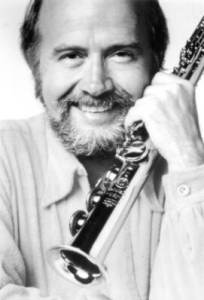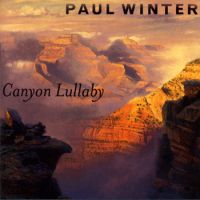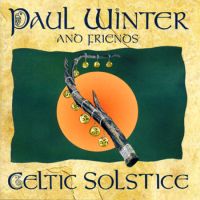
|
Taip štai gana vaikiškai pavadinau 77m. new age saksofonistą Paul Winter, koncertu pažymintį kiekvienas vasaros ir žiemos saulėgrį(-ą-)žas, kuris vasarą išleido šį albumą "Summer"
negaliu be šitos jo "matematikos pamokos" Brazilijoje: https://music.paulwinter.com/track/aula-de-matem-tica-a-mathematics-lesson
Štai ką italų muzikos apžvalgininkas Piero Scaruffi rašo apie šį muzikantą apžvelgdamas jo albumus: One of the founding fathers of world-music, Pennsylvania-born white alto-saxophonist Paul Winter (1939) formed his first sextet (alto sax, baritone saxophone, trumpet, piano, bass and drums) while he was studying in Chicago to play an aggressive (and self-penned) form of bebop, as documented on Paul Winter Sextet (december 1961). Instead, they were dispatched to Latin America and, when they returned, they helped popularize the Brazilian sound with Jazz Meets Bossanova (1962) and two albums recorded in Brazil with Brazilian musicians. That Winter's interest extended beyond Brazil was proven by Jazz Meets The Folk Song (december 1963), that integrated the spirit of folksinger Pete Seeger and Woody Guthrie into the context of jazz. And that Winter's interest extended beyond popular music was proven by the Consort, the ensemble that he formed to play a hybrid of jazz, folk and classical music. The Winter Consort (1968) and Something In The Wind (1970) mixed chamber instruments such as the English horn and the cello with the saxophone's jazzy lead and African and/or Latin-American percussion, and the repertory included folk dances and classical pieces. Last but not least, the Consort adhered to the hippies' utopian mood. Road (june 1970) represented the Consort at its artistic peak: cellist David Darling, classical guitarist Ralph Towner, oboe and English horn player Paul McCandless, contrabassist Glen Moore and percussionist Collin Walcott (tablas, congas). The repertory included Towner's Icarus and Darling's Requiem. Towner was the main composer of Icarus (1971), although the longer piece was Winter's joyful anthem Whole Earth Chant. The instrumentation was expanded, with McCandless also on sarrusophone, Towner also on piano and organ, Walcott on sitar and all sorts of ethnic percussion. After Towner, McCandless, Moore and Walcott left to form Oregon, Winter convened a group of friends (including Darling, McCandless, drummer Steve Gadd, guitarist Oscar Castro-Neves) at a farm and recorded Common Ground (1978) amalgamating the voices of the animals with the jazz improvisation. The most influential experiment were Ocean Dream, featuring a humpback whale on lead vocals, three human vocalists and a Latin-jazz sextet, and Wolf Eyes for wolf, two human vocalists and neoclassical sextet. The mesmerizing sound pattern of whales had been popularized by Songs of the Humpback Whale (1970), produced by the zoologist Roger Payne, but Winter turned it into an instrument of a broader ensemble. The "new age" of the 1980s recognized Winter as its spokesman, and his fusion of jazz improvisation, chamber music, world-music and natural sounds as its manifesto. The ecological and spiritual spirit of Winter's program permeated Callings (september 1980), a jam session between sea mammals (recorded all over the world) and jazz musicians playing soprano saxophone (Winter), cello (Eugene Friesen), oboe and English horn (Nancy Rumbel), pipe organ and piano and harpsichord (Paul Halley), guitar (Jim Scott) and percussion (Ted Moore), including the ten-minute Blues Cathedral. Resonating with the new-age spirit of the era, Winter's albums led to the Missa Gaia (recorded between may 1981 and march 1982), the first ever mass to feature a wolf and a whale in the choir, a work drenched in hippy, pan-ethnic and gospel spirituality (the eleven-minute Return To Gaia), and to the Concert For The Earth (june 1984). In the meantime, the impressionist in Winter surfaced on Sunsinger (1983), a trio with Halley and percussionist Glen Velez, and on Canyon (1985), recorded in the Grand Canyon and in a cathedral. Their delicate, evanescent vignettes blended folk melody, neoclassical composure and Eastern meditation.
Whales Alive (january 1987) used the droning melodies of whales to score the chamber music for Winter and Halley. Prayer For The Wild Things (1994), scored for 27 animal voices, seven instruments evoking animal voices, soprano saxophone, Native American choir and three percussionists, was his most ambitious collage ever. Canyon Lullaby (Living Music, 1997) was Paul Winter's first solo album, a live improvisation (structured as 21 brief pieces) inside the Grand Canyon. The mournful, nostalgic leitmotiv, Canyon Lullaby, sounds like a military song. That mood, halfway between melancholy and ecstatic, also permeates First Light, Hummingbird's Ballad, Mars on the Rim and Air For Keeta. The heartbreaking melody of Canyon Chaconne sculpts a human heart in the natural landscape, and Waltz of the Ravens accompanies the dances of the birds. This album is probably his most lyrical work. Celtic Solstice (Earth Music, 1999), featuring a group of Irish and American musicians, was improvised inside the world's largest gothic cathedral, the Cathedral of St John the Divine in New York City. Triumph and Dawnwalker feature the trio of Winter, Paul Halley on pipe organ, Davy Spillane on uilleann pipes. Their slow, intense improvisations sounds more like church music than Celtic jigs. Despite being more original than the average tribute to Celtic traditions, this album can't help falling into some of the annoying stereotypes of so much Celtic music.
Journey With The Sun (2000) added vocalist Arto Tuncboyacian to the Earth Band.
The Consort was very much still active in the 2000s: Miho - Journey to the Mountain (december 2005), Crestone (september 2006), Miho (march 2010).
Už pastarąjį prieš 6 metus - Grammy statulėlės atsiėmimas:
man labiausiai patinkantis jo saulėgrįžos kūrinukas Triumph (saksofonas+dūdmaišis+vargonai) iš '99 koncerto didžiausioje pasaulyje gotikinio stiliaus bažnyčioje - Cathedral of Saint John the Divine:
|
 2016 m. rugsėjo 8 d. 2016 m. rugsėjo 8 d. |
 2022 m. kovo 26 d. 2022 m. kovo 26 d.  2022 m. kovo 25 d. 2022 m. kovo 25 d.  2022 m. kovo 23 d. 2022 m. kovo 23 d. |
Komentarai (2)

Artimiausi įvykiai
Kas vyksta?
Alvydas1 mėgsta Seventh Wave
Alvydas1 mėgsta Doctor Doctor
PLIKASS mėgsta Guns N' Roses dainą Patience
PLIKASS mėgsta Guns N' Roses albumą Greatest Hits
PLIKASS mėgsta Mouth of the River
PLIKASS pakomentavo OMD albumą Bauhaus Staircase
juozasp mėgsta Within Temptation dainą And We Run
juozasp mėgsta Sinergy dainą I Spit on Your Grave
juozasp mėgsta Halford dainą Resurrection
Pokalbių dėžutė
Mike Portnoy










































2016 m. rugsėjo 8 d. 22:09:35
neblogai padirbėta
____________________
sodininkas
2016 m. rugsėjo 8 d. 21:31:23
Tikrai vertas dėmesio saksofono meistras. Esu šį tą jo girdėjęs. Štai proga vėl ką nors jo paklausyti. Sakykim kad ir "Canyon Chaconne"
____________________
Sielos polėkis, išmokantis skrist - Galimybės ribotos, bet pasiryžęs bandyt. Pink Floyd - Learning to Fly